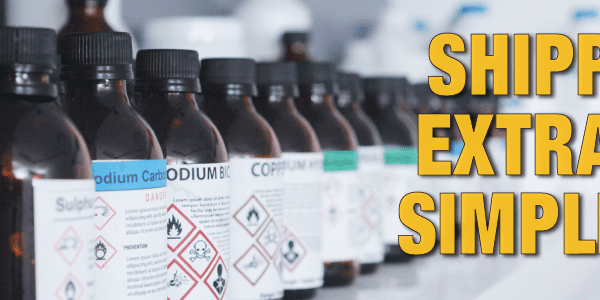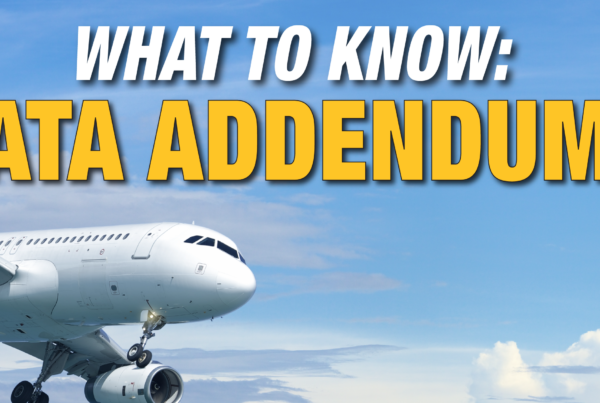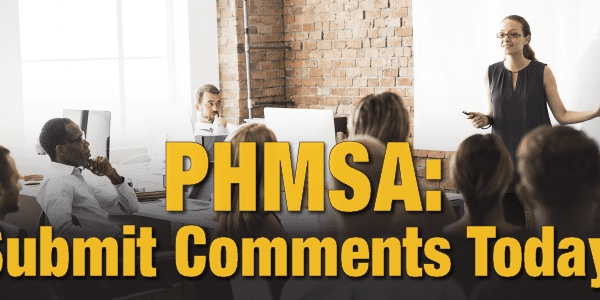As we start our new year, one of our resolutions should be to make sure our dangerous goods shipments get where they’re going. Which means, of course, that we need to update to the 2020 edition of the Dangerous Goods Regulations (DGR) from the International Air Transport Association (IATA). But don’t rely on that completely, because as always, there will be a few corrections and additions that IATA needed to make after the book has gone to print.
In December, IATA published an addendum to the DGR which is available as a free download. These will take effect as of January 1, 2020, so they’re in effect now. The majority of the corrections and additions have to do with State and Operator variations (country variations and airline policies that apply in addition to the DGR), although some affect more general areas. To find the addendum, go to the bottom of their webpage at https://www.iata.org/en/publications/dgr/#tab-2, from where you can download the file as a .pdf in various languages.
First, let’s look at some of the significant changes that are not specific to countries or airlines.
- In section 2.3.2.3, on shipping wheelchairs and mobility aids with spillable batteries, paragraph (c)(2) includes a corrected cross-reference.
- A significant change has been made to several packing instructions for Class 3 liquids when shipped Cargo aircraft only. In the original versions of Packing Instructions 360 to 364, the table for single packagings allows the use of removable-head drums, such as 1A2s and 1H2s. The Addendum removes these options, making the non-removable head drums such as 1A1s and 1H1s mandatory. This could cause serious problems for shippers, so if you ship flammable liquids in drums make sure to consult the Addendum as well as the published DGR.
- In a number of packaging instructions, where the Single Packagings Table for Composites refers to “Fibre” boxes, this has been corrected to “Fibreboard.”
- If you’ve been looking at the example in Figure 8.1.F, you might notice a strange description for UN1950, Aerosols, non-flammable, as being packaged in “1 Steel cylinder.” Apparently, the intent was to change this example to a different gas shipped as a cylinder rather than in aerosol form. The Addendum says to replace “UN1950 Aerosols, non-flammable” to “UN1066 Nitrogen, compressed,” and to change the Packing Instruction to 200, as would be correct to compressed nitrogen.
- A minor correction in section 10.8.3.9.1 gives the correct column to find subsidiary class labels (that’s Column C, not D).
- In Appendix D.1, the Competent Authority details have been changed for Aruba and the United Kingdom.
- In Appendix E.2, new contact details for packaging approvals are provided for the People’s Republic of China.
Now, let’s look at some significant State and Operator variation changes.
- The only new state variation regards the island of Aruba. They now have a variation (AWG-01) that requires operators that wish to carry dangerous goods to, from or over Aruba to get prior written permission from the Department of Civil Aviation. Note that this doesn’t affect shippers, just the airlines.
- FedEx has revised FX-02(e) to extend its requirement for Oxygen to be packed in containers with the specification mark of DOT31FP to also apply to nitrous oxide, nitrogen trifluoride, UN3156, UN3157 and chemical oxygen generators. FX-05(c) and (d), on lithium battery-powered temperature control devices and requirements for pre-approval on data loggers. FX-06 has been revised to allow the use of FedEx Express white and brown boxes and tubes to UN3091 and UN3481, but not for lithium batteries not contained in or packed with equipment. FX-09 now requires all packed in one and overpack shipments to comply with US segregation rules, not just IATA Table 9.3A, and FX-10 states that shipments containing accessible and inaccessible dangerous goods that are dropped off at staffed FedEx U.S. locations must be processed using a FedEx or third-party automation system, not paper airbills or air waybills. Most significantly, FX-18, which requires the use of software for shipping papers that can perform compliance edit checks, is now applicable to all shipments, not just those that originate in the US.
- Air Canada has added a new variation AC-09, stating that they will not accept used and/or refurbished lithium batteries packed with or contained in equipment under Section II, when packed in an overpack.
- Jazz Aviation, Sky Regional Airlines and Air Canada Rouge have all added variations that they will not accept used and/or refurbished lithium batteries packed with or contained in equipment, Section II, when packed in an overpack.
- Emirates has added restrictions on carrying Class 4 and 5 substances in EK-02, and a new EK-03 banning used and/or refurbished lithium batteries packed with or contained in equipment or as battery powered vehicles. This doesn’t apply to automobiles prepared in accordance with Packing Instruction 952, data loggers and cargo tracking devices and aircraft parts containing batteries which shipped by an airline, aircraft manufacturer or a military aircraft operator.
- Jetstar Japan has revised GK-06, restrictions on lithium ion cells and batteries, to remove all the exemptions from those restrictions.
- KLM has amended KL-01 and KL-03 that they will only issue approvals during the booking process, not by e-mail in advance.
- Martinair Holland has added to MP-03 that they will not take lithium batteries under Special Provision A88, A99 or other governmental exemption or approval.
- Oman Air has revised or added to a number of variations, particularly with shipping explosives and radioactive substances. They will no longer accept oxygen generators or gallium, and have banned activated carbon in passenger baggage. On the other hand, they will now take lithium batteries contained in or packed with equipment in accordance with Section II.
Remember that these revisions took effect on January 1, so will be in force now.
Do you have any questions shipping by air? Need help complying with any of the new requirements? Contact us here at ICC Compliance Center, 1-888-442-9628 (U.S.) or 1-888-977-4834 (Canada), and ask for one of our Regulatory Specialists. We can help you complete the process safely and efficiently.







 ICC USA
ICC USA ICC Canada
ICC Canada